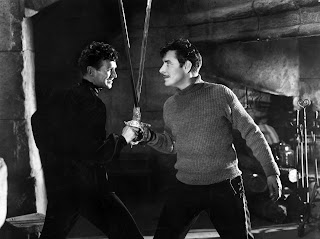Lately I've been finding a lot of really remarkable films to review that fly in the face of my general rule that (a) not many good movies were made during the Second World War, and (b) those that deal directly with the conflict are often the worst. This rule should be doubly true for British films, moreover, since that country was so decimated by the conflict. So the fact that
Pimpernel Smith is even remotely entertaining
, since it is a British film dealing with the war, is something of a minor miracle.
Needless to say, I was extremely apprehensive viewing this movie because it had both the potential to be quite good and, of course, the potential to be abysmal. In it's favor are the facts that it stars Leslie Howard and is a modern retelling of the classic novel
The Scarlet Pimpernel. Against it is the fact that it is a war film, which means some really obvious pro-war rhetoric - some would say propaganda. In addition the lack of resources in terms of actors, many of whom joined up, and supplies makes a lot of war films look amateurish as well.
Howard, of course, had already starred in the 1934 adaptation of the
The Scarlet Pimpernel, and cut a very dashing figure as Sir Percy Blakeney, so he seemed an obvious choice for the Blakeney character in the remake. Of course he doesn't disappoint in this version either, and really almost carries it single-handedly, especially since he was also the producer and director.
In this re-imagining, Howard plays Professor Smith, an eccentric Cambridge don who smuggles enemies of the state out of pre-war Germany under the guise of doing archaeological digs on early Aryan civilization. This immediately gave me the delicious idea, "Mild-mannered professor by day and action hero by night? Sounds like an early version of Indiana Jones." With the Nazis furiously trying to uncover his identity, Smith returns to Germany with a group of students who are unaware of the true purpose for his trip. They discover the truth, however, when a narrow escape leaves their beloved professor wounded, and quickly join his cause. Then, there's the Marguerite character, blackmailed by the Nazis into uncovering Smith's identity. She pegs him immediately, to the incredulity of the Nazis, who can't conceive how anyone as innocuous as Professor Smith could spearhead such daring rescues. She changes her tune when she realizes that Smith could deliver her father, but when the Nazis realize her duplicity, Smith ends up having to rescue her too.
The film does a good job of balancing the nationalistic rhetoric and still telling an entertaining story. I can't say this film is on the level of
Casablanca, but then, what is? I commend it for a laugh-out-loud funny seen in which a bunch of Nazis trying to understand English humor and being absolutely baffled by P.G. Wodehouse and Lewis Carroll. Howard sparkles in all of his scenes, laconically brilliant in professorial mode, and not so overly heroic to defy credulity. Perhaps the one serious blight is the one American student, not because there's anything wrong with the character, but because the actor couldn't do an American accent to save his soul; instead he sounds vaguely Welsh, possibly Scottish, which is quite disconcerting (in fact it took me half an hour to figure out that he was supposed to be from the U.S.). I was also impressed with how well they mirrored key points of the novel without sticking so close to the source material that it seemed like a mere modernization.
I give this film a 7.2, quite high considering its a British-made war film.



